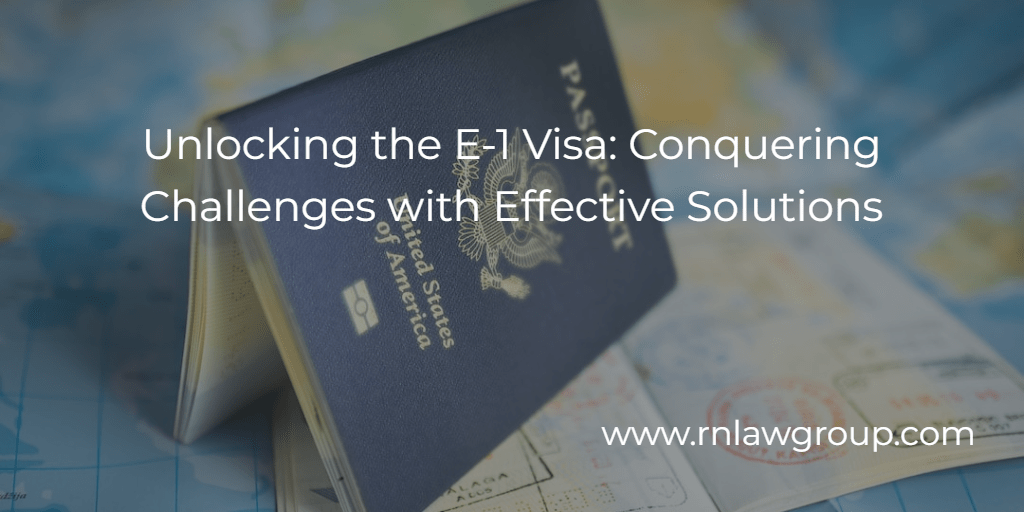
Unlocking the E-1 Visa: Conquering Challenges with Effective Solutions
Introduction
The E-1 visa, also known as the Treaty Trader visa, is a non-immigrant visa that allows individuals from countries that maintain a treaty of commerce and navigation with the United States to enter the country for the purpose of engaging in substantial trade. While this visa can be a valuable opportunity for foreign entrepreneurs and investors, it is not without its challenges. In this article, we will explore the most common issues faced by applicants seeking an E-1 visa and discuss potential solutions to overcome these hurdles.
- Strict Eligibility Criteria
One of the primary challenges with the E-1 visa is its strict eligibility criteria. To qualify, applicants must be nationals of a treaty country and engage in substantial trade between their home country and the United States. Defining “substantial trade” can be subjective, leading to inconsistent decisions by adjudicators. Additionally, the visa does not apply to all countries, limiting its accessibility for many entrepreneurs.
Solution: To increase the likelihood of approval, applicants must carefully document their trade activities and provide evidence of a continuous and significant trade relationship between the U.S. and their home country. Seeking professional guidance from an immigration attorney can also help ensure the application meets all necessary requirements.
- Proof of ‘Substantial Trade’
Demonstrating ‘substantial trade’ is a critical aspect of the E-1 visa application process. Lack of clarity regarding the specific evidence required can lead to confusion and potential rejections. Applicants may struggle to quantify the value of trade or prove that their activities meet the visa’s stringent standards.
Solution: Applicants should provide comprehensive documentation, including financial records, invoices, contracts, and other relevant materials that establish a pattern of significant trade. Collaborating with experienced trade consultants can help clarify the requirements and streamline the process.
- Continuous Trade Requirement
The E-1 visa requires applicants to demonstrate that their trade activities will be continuous during their stay in the United States. This can be particularly challenging for seasonal businesses or those experiencing fluctuations in trade patterns.
Solution: To address this issue, applicants should present a detailed business plan outlining their intentions to maintain consistent trade activities within the U.S. Additionally, demonstrating a history of steady trade in previous years can bolster their case.
- Limited Duration and Renewal Difficulties
E-1 visas are granted for a maximum initial period of two years and can be extended indefinitely in two-year increments. However, renewals may be subject to heightened scrutiny, and applicants must demonstrate that they continue to meet the visa requirements.
Solution: It is essential for E-1 visa holders to maintain detailed records of their trade activities and financial transactions throughout their stay. Engaging in long-term contracts and investments can also showcase a commitment to ongoing trade, thereby improving the chances of successful renewals.
- Lack of Legal Representation
Navigating the complexities of the U.S. immigration system can be daunting, especially for foreign entrepreneurs who may not be familiar with the process. Many E-1 visa applicants face challenges due to their lack of access to proper legal representation.
Solution: Seeking the guidance of an experienced immigration attorney can significantly increase the chances of a successful application. An attorney will help applicants understand the requirements, compile necessary documentation, and present a compelling case before the authorities.
- Visa Denials and Appeals
Despite best efforts, some E-1 visa applications may be denied. This can be a devastating setback for individuals who have invested time and resources in their business plans and relocation preparations.
Solution: In cases of denial, applicants have the option to file an appeal or reapply with additional evidence. Engaging a qualified attorney for the appeal process can bolster the chances of success and address any issues that may have led to the initial rejection.
Conclusion
The E-1 visa provides a valuable avenue for foreign entrepreneurs and investors to engage in substantial trade with the United States. However, its challenges are evident, ranging from strict eligibility criteria to the requirement for continuous trade and limited duration. To overcome these obstacles, applicants must meticulously document their trade activities, seek legal representation, and present a well-prepared case. With the right approach and determination, aspiring treaty traders can successfully navigate the E-1 visa process and unlock the opportunities the U.S. market has to offer.
By: Felipe Jimenez
Felipe Jimenez is an Associate Attorney at Reddy Neumann Brown PC He works in the H-1B Department where he assists clients through all phases of the non-immigrant visa process.
Reddy Neumann Brown PC has been serving the business community for over 20 years and is Houston’s largest immigration law firm focused solely on US. Employment-based immigration. We work with both employers and their employees, helping them navigate the immigration process quickly and cost-effectively.

